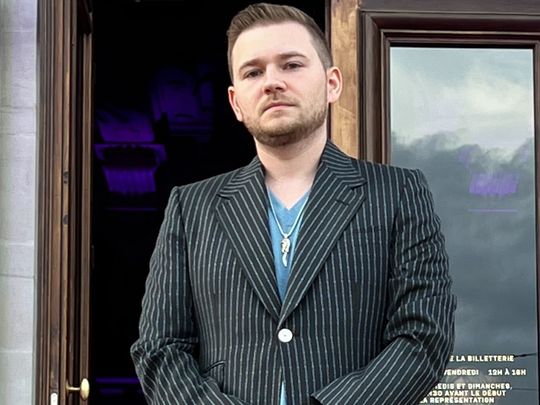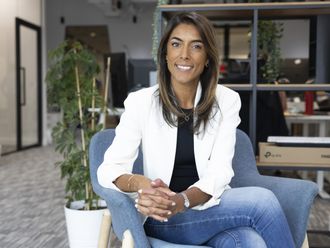
Dubai: Being surrounded by gaming consoles as a teen, Marc Seal grew up particularly fascinated by how video game experiences are created virtually, and this got him to later explore how technologies can be used in the digital sports space – which he proves to be successful at now.
“My first real job was at age 15, working at a US video game retailer GameStop for the holidays, and I spent my earnings how most 15-year-olds would, on video games. Even though I began investing in my own small entrepreneurial endeavours by age 17, I never stopped gaming,” he said.
“I began investing in crypto as early as 2011. I never earned a ton, but for the age I was, it was big,” Seal said. “It was my early exposure to games that sparked an initial interest in how entertainment experiences are created virtually, an interest that later would lead to my entry into the industry.”
Early exposure to games helped
After building his first game production studio at the age of 18, the 32-year-old UAE-based American expat is now a tech entrepreneur by trade, running a start-up with two other co-founders, while still a self-professed game hobbyist on the side.
Seal said his 15-year tech know-how not only got him to work with film production houses like US-based Walt Disney Co., LucasFilms, sci-fi drama Stranger Things, and Topps Co., a producer of trading cards, it got a collector of rare cards like himself into the business of building NFT collectibles.
AI (Artificial Intelligence) is the simulation of human intelligence processes by machines, especially computer systems. Web3 is a conceptualised idea of the World Wide Web which incorporates concepts such as blockchain technologies, and how money is made trading tokens.
This also gave him tech access to launch Sortium, an AI platform generating 3D forms for gaming and virtual production industries, in late 2021. The venture is based on an idea he had at age 18 called Cosmogene – a virtual experience of travelling in an in-game lab while interacting with it real-time.
Start-up costs can get ‘overwhelming’
“Before we started the company, we put together a plan for how we wanted to approach the market and presented it to investors. We then secured funding of approximately $1.25 million (Dh4.6 million) to begin operations,” he said.
At a time when crypto start-ups are struggling to raise funds, earlier this year Seal’s Sortium was able to raise $7.75 million (Dh28.46 million) in funds, with crypto hedge fund Arca among its key investors.
“There were many costs to starting Sortium. We needed a large team of specialised individuals which drastically rose the need for sizable start-up capital. Key expenses are website domain and web hosting tools, computers, salaries for staff, office space, among others,” Seal detailed.
“The list becomes quickly expansive and can feel overwhelming. It’s also important to note expenses many overlook such as corporate insurance (depending on jurisdiction), branding, legal costs, and payroll systems.”
Moving some operations to Dubai now
Seal went on to describe how the US-based business is currently in the process of moving some of its operations to Dubai. “The expenses vary drastically based on where we are coming from. For Sortium, travel and boarding may be the largest initial expenses,” he said.
“Being granted UAE Golden Visas eased immense amount of stress to operate like making it possible to setup offices and move staff, and the costs of setting up in Dubai are worth it. Time will now tell what levels of revenue can be derived from holding operations in Dubai, but the perks are obvious.”
When asked how his business model makes money, Seal stressed how the venture focuses on users and partnerships with large studios. “Currently we have around 5 major studios and 120,000-plus game developers signed up for early access,” he added.
“We are not break-even (profitable) yet but are on target to be and hit profitability by the end of 2024. As we are still in uncharted market territory with AI technology used in gaming production, finding product market fit is challenging and then pricing to the market is equally hard.”

It was my early exposure to games that sparked an initial interest in how entertainment experiences are created virtually, an interest that later would lead to my entry into the industry
Seal’s Business Lesson #1: ‘Clearly separate use of corporate and personal funds’
As the CEO of a start-up, one of the lessons Seal learnt early on was to categorically maintain and manage funds used for different purposes, be it when it comes to personal use or the funds that go into corporate accounts.
“There must be clear separation of corporate and personal funds management. I manage corporate budgets stringently while embracing occasional luxuries in his personal life, and balancing personal expenses with investments and desires,” he said.
“Setting up a business comes with numerous challenges. Perhaps most critical, is the challenge of identifying value and who provides value to your business. One of the greatest lessons I’ve learnt is to make those working with you prove their value before investing too much in them.
“This goes for vendors, partners, employees etc. If you rely on external funding, it’s very easy to squander it before being sustainable. Treat your corporate funds as if they are your own, be responsible for money and make those you invest in be responsible for what you give them.”
Seal’s Business Lesson #2: ‘Do not allow debt to control your savings or your business’
As a young earner who worked with his parents, Seal remembers always having an appetite for taking risks. “While my parents would buy me some things, much of it I had to earn through my work. I didn’t grow up wealthy or with some of the more vital financial teachings one would want.
“During the summers I worked in my father’s home kitchen and bath remodelling company, and in a hair salon my mother managed, helping with odd jobs until my first real job working at Gamestop at age 15. This taught me valuable lessons of money management,” Seal said.
“My mother taught me to respect money, save and perhaps her most critical lesson was not to let debt control me or my business today. Over my growing years I took many financial risks and learnt along the way, with having my first studio at 18, which ultimately was a failure, being one such tried-and-tested risk.”
My advice to fellow entrepreneurs: “Get out there and start. Experiment with smaller ideas and business practices and refine skills through trial and error. We learn best from our own mistakes. What feels like costly lessons today will be invaluable to you in the future.”
How do you manage savings, investments?
Seal takes a percentage of his earnings and split it between investments and future opportunities, he said. “There is no one size fits all to this. Many will suggest specific breakdowns for finances, but I find this is too personal.
“At times, your hobbies can lead you to better and more informed investment decisions. Split your risk as much as possible but invest in your future through your own areas of expertise. This goes for financial tools as well, which is only as good as you are with it and how much you use it.
My advice to fellow savers and investors: “There is no substitute for doing your own research to find the best options for self-organisation and finance management.”
2. Be disciplined in who you invest in but when you find great people who provides value, secure them. “Don’t spend imprudently, but don’t underspend on those who gives you most returns,” Seal added.
3. Find great financial advisors. “If you are managing your company then your time is limited. It’s critical to also find individuals you can have assist with tracking and budgeting,” the serial entrepreneur added.










